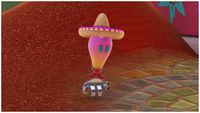Volbonan
Volbonans are fork-like creatures with eyes from Super Mario Odyssey. These creatures reside in the Luncheon Kingdom, and their culture revolves around food and cooking. They appear in different bright colors, wearing chef hats and neckerchiefs, and their tines can function as both arms and legs. The Volbonans are experts at cooking Stupendous Stew, which Bowser steals from them to serve at his upcoming wedding to Princess Peach. They are menaced by a giant bird named Cookatiel, who takes over making the stew from them.
Some hatless Volbonans can be found stuck to walls. Mario can capture them with Cappy and use them to shoot himself in the direction the player aims with the left analog stick, flicking him up gaps or up sheer walls, similar to the Poles in the Metro Kingdom. Some sequences in the game involve flinging Mario from one captured Volbonan to another.
At the game's finale, in the Moon Kingdom, a few Volbonans can be found in attendance of the wedding between Bowser and Princess Peach. Like other attending members, they were brought forcefully. After beating the game, they can be found at the entrance of the Moon Kingdom near the Odyssey, and in the start of Darker Side.
Like many of the supporting characters, Volbonans will cower and refuse to talk to Mario if an enemy gets too close to them, regardless whether Mario has captured the enemy in question or not.
Gallery
- SMO Orange Volbonan.jpg
A orange Volbonan
A Volbonan functioning as a Pole
Volbonans employed at Crazy Cap.
Names in other languages
| Language | Name | Meaning | Notes |
|---|---|---|---|
| Dutch | Vorkaniër[?] | From vork (fork) and vulkaan (volcano). | |
| German | Schlemmerling[?] | From Schlemmer (slang for a gourmet or glutton). | |
| Italian | Vulcanbonese[?] | From (Monte) Vulcanbon (the Italian name of "Mount Volbono"). | |
| Russian | Волбонец[?] Volbonyets |
Volbone | |
| Spanish | Delisubiano[?] | From (Monte) Delisubio (the Spanish name of "Mount Volbono"). |












